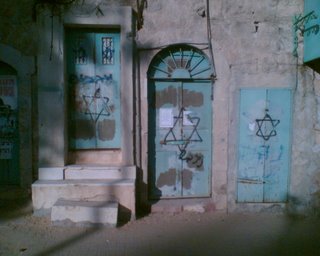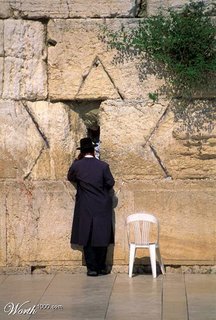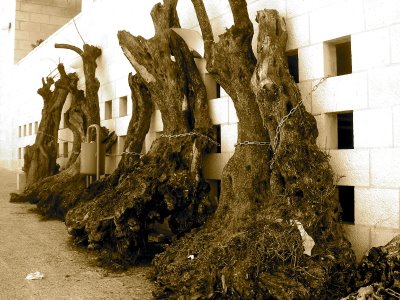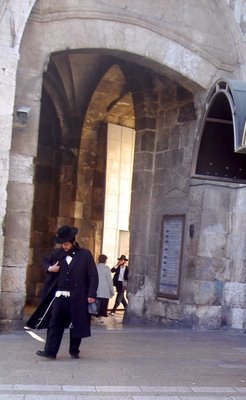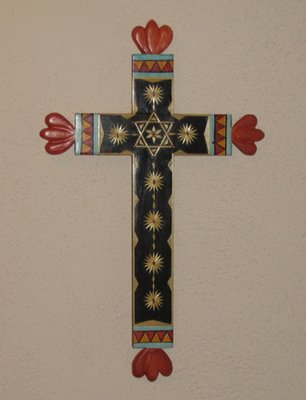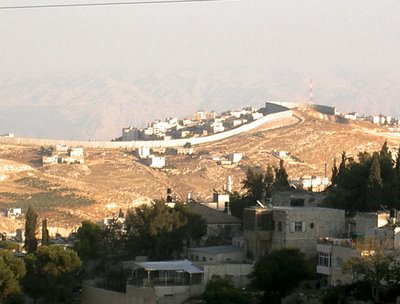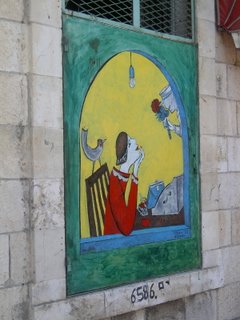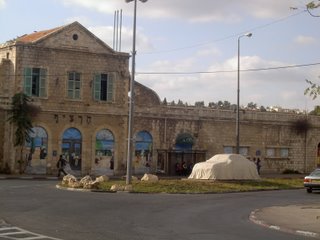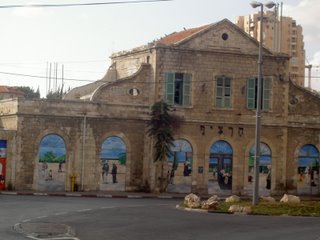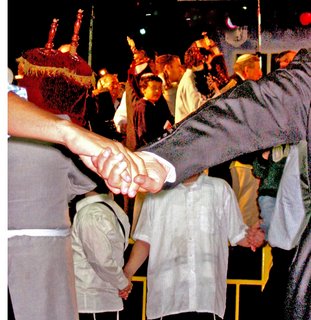 If former Prime Minister Ariel Sharon were ever to regain consciousness, there would be alot of awkward explaining to do about what's gone on since January when he slipped into his coma. It hardly classifies as brilliant standup --more a comatose comedy shtick-- yet this imaginary conversation has been linked and getting yuks for months in Hebrew cyberspace, and finally was translated into English.
If former Prime Minister Ariel Sharon were ever to regain consciousness, there would be alot of awkward explaining to do about what's gone on since January when he slipped into his coma. It hardly classifies as brilliant standup --more a comatose comedy shtick-- yet this imaginary conversation has been linked and getting yuks for months in Hebrew cyberspace, and finally was translated into English.
When Arik Woke Up
At Tel Hashomer Hospital, it is just before dawn, and Shmiel the orderly is on night duty in the private room of the “sleeping” former PM Sharon.
All the world, except Sharon himself, knows that he is no longer the Prime Minister of Israel. Shmiel sits, chomping on an apple, while the official bodyguard snores away.
Suddenly, all the machines start to beep madly. The PM is waking up!
Sharon stretches and says, “I haven’t slept like that for a long time! Get me [Reuven] Adler, I have some ideas for a new direction.”
Shmiel says, “Good morning, sir. How do you feel?”
Sharon answers, “I am dying of hunger. Where am I?”
The shabak agent continues to sleep while Shmiel explains to Sharon about his prolonged health crisis.
Sharon thinks it is all a practical joke and says, “So tonight you fooled with the PM, eh Shmiel?”
Shmiel says, “Sorry, sir, but truly, you are no longer the PM.”
This takes a few moments to sink in. Then Sharon asks, “So who replaced me?”
Shmiel answers, “Ehud Olmert.”
Sharon reacts, “Olmert? That Jerusalemite putz? What will happen if war breaks out, he does not know how to run the army! At least Shaul [Mofaz] is still there!”
Shmiel answers, “Mofaz is the Minister of Transportation.”
“So who is the Defence Minister?”
Shmiel says, “Peretz.”
“That old man is still alive?!” asks Sharon in wonderment.
Shmiel whispers trembling, “not Peres, Peretz. Amir Peretz.”
“What? Are you crazy? I close my eyes for a minute and you guys let a labor leader take over the defence of the country?! Not all the factories in Dimona are the same. Does he know that? Listen, get Omri here right away. He will fix everything.”
“Sorry sir, Omri is on his way to jail.”
“Jail?? for that shtus? I do not believe it. So get me my lawyer quickly. Get Klagsbald.”
Shmiel responds, Klagsbald is on his way to jail.”
Sharon calms down and says, “I knew I could count on Klagsbald. he will get Omri out of it.”
Shmiel corrects him and says, “No, sir. Klagsbald is also on his way to jail. He was driving and not paying attention and caused an accident unintentionally running over and killing a young woman and her son.”
Sharon said, “So bring me [Avigdor] Yitzchaki. He always knows how to fix these situations.”
“Sorry, sir. Yitzchaki is under his own investigation for tax fraud. He fixed things too much this time.”
“Can’t be. I know Yitzchaki. They must be framing him. So get me the Head of Police.”
“Sorry, sir, but Karadi is in investigation.”
“Of course he is. He is the head of police. I am sure he is in the middle of a number of investigations!”
“No, sir. Thi sis an investigation against him!”
Sharon takes a deep breath. It can’t be. The whole justice system has been ruined! We must get them out of this. Get me the minister of Internal Security, Tzachi [Hanegbi].”
“Sir, Hanegbi has been indicted for fraud, bribery and job fixing.He is not a minister anymore.”
“So get me the Justice Minister. Who did Olmert appoint?”
“Haim Ramon”
“So get him here!”
“Sorry sir. I can’t. He has been indicted and is on trial for misconduct.”
“What? So get me the president. That is still Katzav, right?”
“sorry sir, but Katzav is under investigation as well, for misconduct and wiretapping.”
“So get me the Chief of Staff, Boogie [Moshe Ayalon]. Sorry I mean Halutz, right?”
"Sir, he got into some trouble in the Lebanon War. Nothing criminal. he sold some stocks. He will soon be giving testimony to an investigative committee.”
“Halutz?? he was a young Piper pilot during the Lebanon War!”
“Sir, that would be the second Lebanon War, while you were sleeping. We… how should I say? lost the war but the PM said we should be patient, victory is coming.”
Sharon looked around his room. “What is your name and what is your position?”
“Shmiel, sir. I am a hospital attendant.”
“Ok, Shmiel. Do not tell anyone about this conversation.”
“You can count on me, sir.”
“I am going back to sleep."
Zzzzzzzzzz
 Snowflakes were drifting down all over Jerusalem, while the Egyptian foreign minister asserted at his joint press conference this afternoon with Israel's Tzipi Livni that this was no snow job. Aboul Gheit announced to gathered reporters that the kidnapped Israeli soldier, Corporal Gilat Shalit, is alive after six months in captivity. What's more, Egypt is actively working for his release.
Snowflakes were drifting down all over Jerusalem, while the Egyptian foreign minister asserted at his joint press conference this afternoon with Israel's Tzipi Livni that this was no snow job. Aboul Gheit announced to gathered reporters that the kidnapped Israeli soldier, Corporal Gilat Shalit, is alive after six months in captivity. What's more, Egypt is actively working for his release.






 r. He was quickly cleared when a post-mortem found Levin had died of natural causes. His was an important passing, however. It left Simintov, a once-wealthy carpet seller who had suffered a Dickensian fall from grace, as Afghanistan’s last remaining Jew. He is penniless, alone and trying to pick up the pieces of a life ruined by the feud. “I remember when he had many cars. He used to come home with bundles of money,” says Ahmed Nasir, 18, a locksmith whose family operates a Flower Street stall at the foot of Simintov’s residence. “He doesn’t have anything now because of Yitzhak’s bad behaviour.” In a way, Simintov’s personal history mirrors that of his people, whose 800-year history in Afghanistan seems destined to end with him.
r. He was quickly cleared when a post-mortem found Levin had died of natural causes. His was an important passing, however. It left Simintov, a once-wealthy carpet seller who had suffered a Dickensian fall from grace, as Afghanistan’s last remaining Jew. He is penniless, alone and trying to pick up the pieces of a life ruined by the feud. “I remember when he had many cars. He used to come home with bundles of money,” says Ahmed Nasir, 18, a locksmith whose family operates a Flower Street stall at the foot of Simintov’s residence. “He doesn’t have anything now because of Yitzhak’s bad behaviour.” In a way, Simintov’s personal history mirrors that of his people, whose 800-year history in Afghanistan seems destined to end with him.








